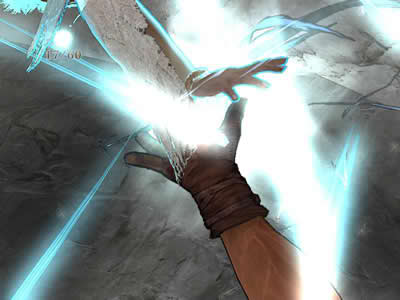
Now there’s a big question. How about I start by answering it in the context of video games?
In video game history, the outlook after death is generally a bit bleak: punishment awaits you. Usually this is in the form of a tax on your time, forcing you to repeat something you have already done, i.e. continuing from the start of the level. However, not all games take this approach. So, what if a game was a bit nicer to its players?
In the latest Prince of Persia, released in 2008, when you die, you are immediately rescued by your companion, Elika, and set back down in perfectly good condition to immediately try again the task at which you just failed, almost falling to your death. If you misjudged a jump, this immediate retry can allow you to very quickly figure out how to judge distances. Or perhaps you will simply never learn, and will randomly fling yourself out over any old chasm since there are no consequences for dying? Maybe a little punishment is a good thing then?
At the other end of the spectrum, there is Super Ghouls ‘N Ghosts. First of all, this game is very difficult. Unless you are armored, you will die if any enemy so much as touches you (I know there are more difficult games, but this one has awesome music). Okay, there’s nothing wrong with a difficult game, but how does it treat you when you die? Well, you have to go back to the beginning of the level—way back. Remember that particularly difficult part that took you 100 tries to get by? You have to do it again and again until you reach the next checkpoint alive, which is invariably quite far away.
This approach is a bit too mean to its players, in my opinion. There is a lot of busy work before you even get to retry the difficult parts, and the challenges themselves are more about extremely fine-tuned muscle memory than anything else—thus for all but twitch gaming savants, the learning is invariably slow-going. But why does this game even exist if it’s so mean to its players?
The same reason that all evil exists: money. This mechanic of making a game very difficult, and requiring you to redo a lot of it when you die most definitely comes from old cabinet arcade games. When the purpose of the game was to make money by eating gamer quarters, it paid to interrupt gameplay often and to put you back a ways so you don’t finish the game too quickly. It’s simple economics!
Great, but most of us don’t play in arcades anymore; why do some game designers still believe that their gamers should suffer? Is one just better than the other? Should there be more punishment upon death or less? Should players be encouraged to be more careful and attentive while playing or should they be allowed to learn quickly by quickly repeating a task until they get it right? For me, the answer lies somewhere in the middle.
For a game that forces me to replay a really tedious 10 minutes over and over before the actual challenge, I am not particularly impressed or drawn back to the game to play again. On the other hand, I play Dungeon Crawl, which is extremely difficult (I have played for 10 years and have not beaten it) and in which all death is permanent.
So what should happen when you die? I suggest that it be whatever encourages a player to learn without destroying his or her will to live (in the game, of course).








